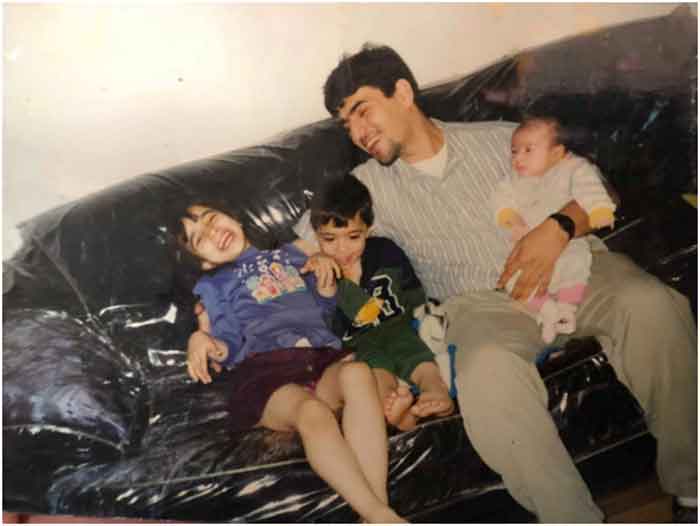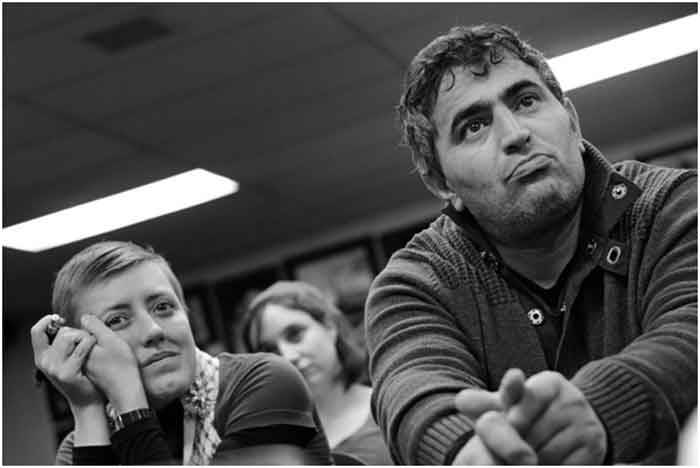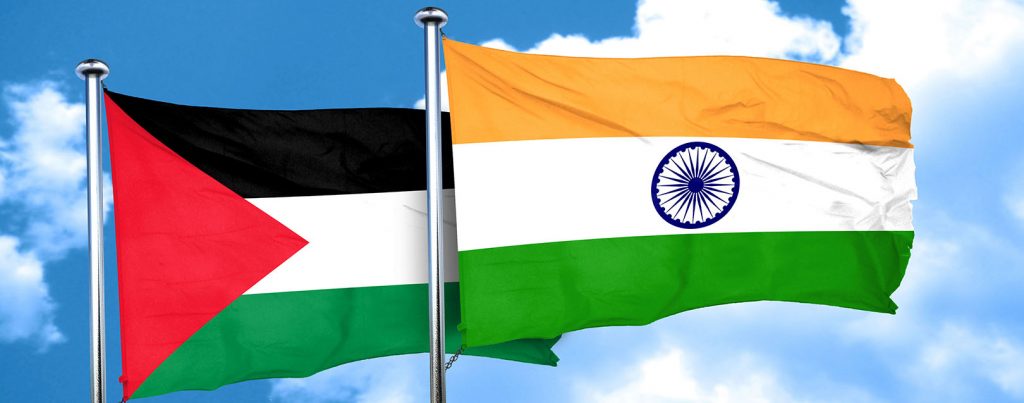Khaled Barakat and Samidoun Palestinian Prisoner Solidarity Network international coordinator Charlotte Kates attending the conference of the International League of Peoples’ Struggle Toronto, Canada 2013 (courtesy: Khaled Barakat)
Palestinian writer and researcher Khaled Barakat, whose activism and writing aims to expand the pro-Palestinian movement at a mass level by educating young Palestinians outside Palestine, is being subjected to a smear campaign in Canada that attempts to involve the Canadian government and its legal system. As Barakat says below, “The silencing of Palestinians and Palestine solidarity closes the space for expression and advocacy for everyone, especially for antiracist and antifascist movements.” Barakat continues to find ways to speak out from a radical left perspective with a vision of rebuilding the labor movement, the student movement and the women’s movement of the Palestinian people as a necessary task of liberation.
A lot has changed recently in the discourse regarding Palestinian resistance as more and more people in academia, politics and main stream media are coming to grips with the reality of Israel as an apartheid, settler-colonial, Jewish supremacist state. Along with that has come a shrill push-back from Zionist Jewish organizations that continue to use false accusations of antisemitism or false allegations of terrorist activity against Palestinians who are legitimately resisting their occupation and Jewish settlement of their land. Smear campaigns against you, both in Germany and Canada, quote “Israeli intelligence agencies” naming you as part of a “terrorist organization” (the PFLP). How do you respond to these allegations?
**
Before we talk about these attacks, I want to pay my respects to a heroic Palestinian journalist who was assassinated this morning in Jenin refugee camp, Shireen Abu Aqleh, correspondent of Al Jazeera. She was a highly respected and widely admired voice and truth-teller of Palestine. Palestinians, across the board, are mourning and condemning this crime, which is part of a pattern of Israeli crimes. She is not the first Palestinian journalist to be assassinated by the occupation forces. Israel does not want the world to see its crimes, and Shireen was exposing the crimes of the occupation in Jenin when she was murdered. I would like to send my condolences to her family, friends, colleagues and the Palestinian people on this great loss of a brave woman.
As for the attacks against me — and also many other Palestinians in diaspora, like those on Dr. Rabab Abdulhadi, Nerdeen Kiswani, and many others — these reveal a Zionist weakness. They are crying out for their allies to do their dirty work, namely to criminalize Palestinians who are organizing for liberation. Israel cannot detain Palestinians outside Palestine in administrative detention without charge or trial, as they do on a daily basis for hundreds of Palestinian journalists, community organizers, writers, leaders. And so, they call on Germany, France, Canada, the United States — their allies and backers — to repress the Palestinian community.
These attacks on me also reveal the nature of security coordination between these countries. One interesting thing the National Post article revealed is that a meeting of 50 Israeli and Canadian security personnel actually took place reportedly to discuss me. This means that Israel is sending its intelligence agents here to peddle lies to the Canadian government and create fear in the Palestinian community, hoping to incite state and individual violence against a visible and vocal Palestinian writer.
As for the “terrorist” allegations, I do not know of any Palestinian progressive organizations or individuals in North America that have not been alleged by Zionists to be a proxy, agent or member of one or another Palestinian resistance group or political party, particularly the PFLP. Even hosting a cultural event in honor of Ghassan Kanafani or speaking seriously about his work will be met with allegations about “supporting terrorism.” For example, the Palestinian Youth Movement has been viciously attacked for organizing a resistance arts anthology of Palestinian young people’s writing, named for Kanafani.
**
So, the attacks against you and other Palestinian activists in the diaspora is Israel’s way to “mow the lawn” and disrupt the resistance movement. As Sebastien Roblin put it: “Israel’s confidence that it could go on indefinitely ‘mowing the lawn’ without seeking a political solution may seem accurate. But the mowing may not merely be perpetual, but self-perpetuating.” Given Israel’s violence against Palestinians past and present, are you in fear for your life? What protection can you expect in Canada?
**
These kinds of incitements could certainly have ramifications, of course. That is one of the objectives of such attacks. It is Canada’s duty to protect its citizens. But just like others who have faced many similar smear campaigns, I am not going to be deterred or intimidated.
My case is not a personal matter associated with me as an individual. These attacks against Palestinians represent the colonizer’s reaction to the growing role of Palestinians in exile and diaspora. Israeli intelligence officials intensified this campaign immediately after we convened the Masar Badil conference in Madrid and Beirut in October 2021. We saw what happened recently with our comrades in France and the attempt of the Emmanuel Macron regime to dissolve the Collectif Palestine Vaincra, which is an integral part of Samidoun and the struggle for return and liberation. Of course, this repressive attack was recently dealt a severe setback by the French courts, which have suspended the order against the collective.
The Zionist attacks against Samidoun reflect this Zionist fear. Why? Because Israel and the Zionist movement do not want to see the struggle of Palestinian prisoners becoming known to the world. Instead, they want to market a false image of the prisoners as “terrorists,” without their national cause, and hide their experiences, stories and tremendous sacrifices.
It further appears that Zionist organizations in Canada, such as CIJA, B’nai Brith and others, are working as tools and puppets of the Israeli Mossad and the Israeli embassy, aiming to repress Palestinians here. In fact, the last thing on their mind is the security of Canada or people in Canada. They are aiming to spread fear and racism by mixing lies and facts in order to create divisions amongst people. But they are failing in this attempt. And one example of how they are failing is that the young generation — youth and students — are speaking and voicing their position in universities and colleges, passing resolutions and implementing policies to support Palestinian liberation and boycott Israel. Israel fears the reality that the rising generation supports Palestinian rights and opposes racism and colonialism.
**
Michael Lavalette has written, “The liberation of Palestine will not be delivered by the international solidarity movement. The liberation of Palestine will be painted in Palestinian colours! It is the people of Palestine — and the wider Arab world — who will lead the campaign for their own freedom (from imperialism, from Israel and from their own quisling leaders). It was the same in South Africa — it was the people of South Africa who threw off the shackles of apartheid, not the international anti-apartheid movement. But whilst we must start with that assertion, we must also make clear that there is a key supportive role to be played by the global solidarity movement.” Would you comment on this?
**
It is natural that a people who are under colonization are the ones who are responsible to free themselves, and it is their right to lead their struggle for liberation. The solidarity movement with the struggle of people who are engaged in liberation struggle is vital and important, but it does not supersede the people’s resistance. For example, the Palestinian-led Boycott, Divestment and Sanctions movement (BDS) is an important tool to support the Palestinian people, but it cannot replace the national liberation movement. I am a firm believer in Kanafani’s quote: “The Palestinian cause is not a cause for Palestinians only, but a cause for every revolutionary…as a cause of the exploited and oppressed masses in our era.”
It is a clear fact today that the Palestinian people, after 74 years of dispossession, colonization and oppression, have demonstrated an iron will to hold fast to their struggle for return and liberation. In a few days, Palestinians across Palestine and in exile, from the village of Me’ar, to the refugee camps in Jordan, Syria and Lebanon, to dozens of cities and towns around the world, will be united in coming to the streets to uphold this unity and promise of a future democratic Palestine. Israel fears this popular unity. We witnessed the popular uprising last year, in 2021, that signaled a new stage of the Palestinian people’s struggle.
**
How do you differentiate between terrorism and legitimate armed resistance against Israel?
**
This is an important question, because the battle that we are engaged in, here in Canada, is in many ways about the legitimacy of the Palestinian resistance. Currently, there are Palestinian and Lebanese organizations that are part of the resistance, but they are designated as so-called “terrorist entities” in Canada, or “Foreign Terrorist Organizations” in the United States. This is a purely political designation and method of criminalization. The Canadian government was wrong to ally itself with Israel to the extent that it is difficult to differentiate its official position from the Israeli position in many cases. Even from a Canadian perspective, how can Canada engage in a dialogue with the Arab world if you criminalize Hezbollah, Hamas, the PFLP, let alone the Arab and Palestinian communities here? These are major parts of a legitimate anti-colonial resistance movement.
We are not running away from this discussion. In fact, we are campaigning to challenge these designations. This is more important than ever for us as Palestinians, because the Palestinian resistance is the sole legitimate representative of the Palestinian people.
People under colonization have the right to resist to obtain their liberation and self-determination, and Palestinians have been resisting since 1917. We fought British colonization from 1917 to 1948. For that matter, the Palestinian people fought Napoleon and the French when they tried to colonize Palestine! The resistance was legitimate then, and it is legitimate today. We are still engaged in the struggle for liberation.
**
What are the deeper roots of US and UK support for Israel? In your view, what are the mutual interests between Israel and these Western powers? Is there a double standard in how these countries discuss Ukraine and Palestine?
**
The Zionist settler project in Palestine was and still remains an imperialist project. The colonizing powers’ relationship to this project has varied between one another at a particular time. Originally, British and French colonialists were the main backers of the Zionist program, for example in 1917. Later, as U.S. imperialism advanced in the region and in the world, today, Israel is basically a U.S. project. That does not mean that the UK, France, Australia, Canada, Germany, are not primary backers of Israel. They still are, because they are either colonial powers or settler colonial states themselves. Israel is a business project that the imperialists will shut down when it becomes more costly than it is beneficial to their interests.
The one standard that the U.S. uses to determine its position is its interests — not necessarily the interests of the people, but the interests of the rulers and the arms dealers. So when government officials arm, fund and salute “Ukrainian resistance to Russian aggression” while criminalizing the Palestinian resistance fighting back against 74 years of ethnic cleansing, siege and colonization, it is clear what determines their position. We can talk a lot about what is happening in the crisis in Ukraine and the responsible parties, but this is a longer discussion.
**
As an activist for Palestine, how would you describe the achievements of your movement to date? What are your plans for the near future and how optimistic are you that you will witness the liberation of Palestine in your lifetime? On what factors do you base your analysis in this regard?
**
The Palestinian movement today, and in the heart of it, the resistance in Palestine, is accumulating its strength on a daily basis. You see, things do not happen suddenly. The reason we are witnessing an escalation in Palestinian popular resistance and achievements on all aspects, particularly the unity of our people, their political principles and slogans, did not come because people woke up one day and started an uprising. It happens with a historically patient and steadfast process by the Palestinian people. Today, we cannot measure the strength of the resistance in Gaza, for example, as it was in 2008. What does that mean? It means that tens of thousands of Palestinians are busy, day and night, strengthening their resistance.
The same is also true for the international front of struggle. Students did not wake up one day and boycott Israel. The growth in the movement has been built atop many years of struggle and the involvement of large numbers of people, many of whose names are barely known. The crucial, central role of Palestinian youth in the diaspora is one major factor. The largest demonstration on Palestinian prisoners’ day this year was in Berlin, organized and led by Samidoun Deutschland, the work of Palestinian youth, many of whom have been dispossessed several times over. We cannot measure these achievements in one or two years; it is a long march.
**
You are currently engaged in a court battle in Germany. Please explain what the suit is all about and why it is important for you to challenge the influence of pro-Israel lobbyists who succeed in imposing the Zionist so-called narrative or false information on Western governments?
**
Palestinian activists and organizations across Europe are engaged in legal battles, but we are winning. In the arenas of parliaments, mainstream media, etc, the balance of power is in favor of Israel. But in the courts, in legal battles, we win and lose. The Palestine Solidarity Committee in Stuttgart, Germany, just won a legal battle over listing their events on the municipality’s website. In my case, in a court hearing on March 11, the court ruled that the city of Berlin’s political ban on my event on US foreign policy and Palestine was an illegal action. We are planning to continue to challenge all of the injustices that Palestinians are subjected to.
We’ve seen a number of other victories as well, like activists in Palestine Action arrested for direct actions confronting Elbit, the Israeli arms dealer, getting their cases dropped and dismissed, and of course, the recent victory of the Collectif Palestine Vaincra in France, among others. In Britain, the Palestine Return Centre has won legal victories against Zionist groups defaming them as “terrorists.” This is also, and most importantly, backed up by the popular pressure in the streets. We know that the courts and the law are a political space, not a neutral space. The silencing of Palestinians and Palestine solidarity closes the space for expression and advocacy for everyone, especially for antiracist and antifascist movements.
**
Would you tell us something about your childhood experiences growing up in Palestine?

Khaled Barakat in 1992 in New York with his nieces and nephews (courtesy: Khaled Barakat)
The very first memory I have as a child is of Israeli soldiers storming our neighbourhood. I left school and joined the Palestinian working class at age 10, working, sometimes in Israeli factories or selling newspapers in the streets of Jerusalem. You don’t need Karl Marx to tell you that something is wrong with this picture. I remember when the Israeli Histadrut “labour organization” would come to factories to check if they are illegally employing Jewish kids, and they would pass by us, the Palestinian children in the factory, as if we did not exist. In all the jobs I worked in, I don’t remember seeing one Israeli Jewish worker. Selling newspapers in the streets of Jerusalem, for me, was a very intense experience. I’ve written about this, and about running away from the “municipality” vehicles or the “border police.” So you immediately discover that occupation is a multilayered system of exploitation. It is a class, human and national system of exploitation and oppression, and it goes deeper than the images people often see in newspapers or the political discussions that people think of.
As a youth, leaving Palestine to New York, I was involved in organizing youth workers. For us, as Palestinians, workers’ rights are in many ways second to the priority of participating in fighting colonization. It is important, but it cannot replace the national struggle. At least that is how I thought about it as a youth. But later on, through my experiences, I learned that the workers’ struggle is an integral part of the liberation of Palestine. I am one of those who call themselves the generation of the “first” Intifada of 1987. This intifada was also a rich experience for our people that affected everyone. It was the Palestinian working class that led this uprising, this intense experience for our people. And this is why it is so important that we rebuild the labor movement, the student movement, the women’s movement of Palestinian people, as a necessary task of liberation.
Note: This interview was first published on Rima Najjar’s Medium blog.
________________________
Rima Najjar is a Palestinian whose father’s side of the family comes from the forcibly depopulated village of Lifta on the western outskirts of Jerusalem and whose mother’s side of the family is from Ijzim, south of Haifa. She is an activist, researcher and retired professor of English literature, Al-Quds University, occupied West Bank.













































